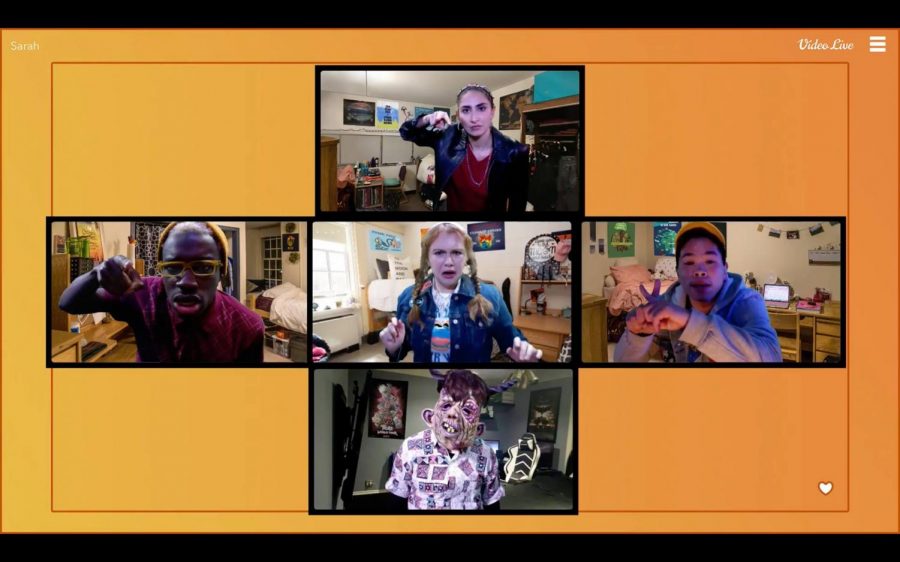Virtual musicals take center stage during COVID-19
Photo courtesy of Emerson College
Actors rehearse via Zoom for Emerson’s original musical, “This Golden Day,” produced last fall.
March 28, 2021
One year after COVID-19 shut down the nation, the Massachusetts arts industry lost $588 million. Due to COVID-19 restrictions, arts programs are unable to showcase in-person productions that they have worked on for months. In efforts to combat the loss of money and performances, colleges in Boston are embracing experimentation with virtual musicals.
Unlike plays, musicals introduce a whole new set of challenges when it comes to the virtual format. With its recent surge in popularity, colleges around Boston have produced virtual musicals in different ways.
Justin Callanan, a third-year mathematics major, is the director of “Twelfth Night,” the spring musical for NU Stage, Northeastern University’s student-run musical theatre company. Streaming on Vimeo May 21 and 22, “Twelfth Night” is a pre-recorded musical, strung together by isolated clips of actors in different locations.
Callanan sees this as both a pro and a con to virtual musicals. Actors do not have to memorize the whole musical at once but are expected to perfect each song and turn in a final recording within two to three weeks.
“That’s not the experience we usually get performing in a show,” Callanan said. “You’re always with the other castmates and you get to see the show grow over time.”
Callanan wanted a “natural feel” for this virtual musical. The NU Stage actors filmed the scenes in their bedrooms or in front of a white background.
There are no green screens provided for the NU Stage actors, but they take advantage of being able to film in different locations. Callanan recalls an actor from NU Stage’s virtual musical last semester filming a scene in front of a lake.
However, this is not the case for the students performing in the spring musical at Emerson College. Annie G. Levy, the artistic director of Emerson Stage’s “Spring Awakening,” has recognized the challenges that come with green screens.
Emerson Stage has transformed their vacant dressing rooms into individual acting studios. Each of these rooms contains a green screen, a computer and a high-powered microphone and can only be occupied by one person at a time.
Streaming on ShowTix4U from April 15 to 18, “Spring Awakening” is live. The Emerson Stage actors will perform in their individual acting studios in front of a green screen, making it appear as if they are all together in the same room. Levy recognizes the challenge in finding a way to push against the actual isolation.
“It’s the challenge of learning to have a relationship with something you are either only seeing by looking through a camera or only seeing because there’s a spot on the wall where you’ve been told to look to make it seem like you are looking at another person,” Levy said.
Isaac Leaverton, the music director of last semester’s “Mr. Burns: A Post Electric Play” at the Boston Conservatory at Berklee, or BOCO, understands both the struggles of pre-recorded and live virtual musicals. BOCO’s production was performed live as a play in Act One and Act Two and pre-recorded as a musical in Act Three.
One of the biggest challenges of pre-recorded virtual musicals is the editing. Recordings have to be stitched together concisely so the actors sound like they are singing with each other.
“Through growing pains, we’ve learned that you [have to] plan for more editing time,” Leaverton said. “If you think you need one week, you need two. If you think you need two, you need three.”
Editing music tracks and videos together was also a tough skill Callanan had to learn. With the opportunity of directing a virtual musical, Callanan discovered these new talents within his production staff. Last semester, the audio editor wanted to try out video editing for the first time.
After putting together a rough first draft of the clips, the video editor was not sure if it was good. Callanan, on the other hand, thought it was close to final quality.
“I watch[ed] it and it [was] phenomenal,” Callanan said.
Along with new talents, such as video editing, new creative ideas are found in experimenting with virtual musicals as well. Levy has learned to look past the disadvantages of the COVID guidelines, and instead, look for the positives.
“If you embrace the constraints, the amount of creativity can come from simply embracing that this is the reality we have to work with can be quite astonishing,” Levy said.
Eventually, in the near future, musical theatre will return back to normal and live in-person productions will resume. Even though Leaverton said he’s learned to adjust to virtual productions, he looks forward to working with people again.
“There’s something about being in the same room and creating together in the same room,” Leaverton said. “I feel like I found ways in my teaching to work [toward] collaborating and finding space together in the room, but I don’t know if I found a way that completely gives us the same feelings and the same energies we get being in the same room. I miss that.”







